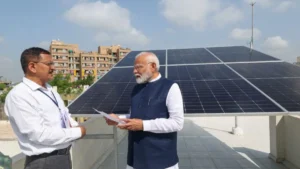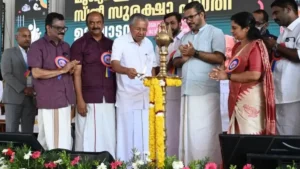On September 2, 2024, the Union Cabinet, chaired by Prime Minister Narendra Modi, approved seven significant schemes aimed at improving farmers’ lives and increasing their incomes, with a total financial outlay of ₹13,966 crore.
1. Digital Agriculture Mission (₹2,817 crore)
This mission seeks to leverage technology to enhance farmers’ lives by establishing a robust Digital Public Infrastructure. Key components include:
Agri Stack:
- Farmers Registry: A comprehensive database of farmers.
- Village Land Maps Registry: Digital records of village land maps.
- Crop Sown Registry: Documentation of crops sown across regions.
Krishi Decision Support System:
- Geospatial Data: Utilization of satellite imagery for agricultural planning.
- Drought/Flood Monitoring: Real-time tracking of weather-related events.
- Weather/Satellite Data: Access to accurate weather forecasts.
- Groundwater/Water Availability Data: Information on water resources.
- Modeling for Crop Yield and Insurance: Predictive analytics for crop yields and insurance assessments.
The mission also aims to integrate modern technologies like AI and Big Data, connect farmers with buyers, and provide new knowledge through mobile platforms.
2. Crop Science for Food and Nutritional Security (₹3,979 crore)
This initiative focuses on preparing farmers for climate resilience and ensuring food security by 2047. Its pillars include:
Research and Education: Advancing agricultural research and education.
Plant Genetic Resource Management: Conservation and utilization of plant genetic resources.
Genetic Improvement for Food and Fodder Crops: Enhancing the quality and yield of food and fodder crops.
Pulse and Oilseed Crop Improvement: Development of high-yielding pulse and oilseed varieties.
Improvement of Commercial Crops: Enhancing the productivity of commercial crops.
Research on Insects, Microbes, Pollinators, etc.: Studying beneficial organisms for agriculture.
The scheme aims to address challenges posed by climate change and ensure sustainable agricultural practices.
3. Strengthening Agricultural Education, Management, and Social Sciences (₹2,291 crore)
This measure aims to prepare agriculture students and researchers for current challenges by:
Modernizing Agri Research and Education: Updating curricula and research methodologies.
Aligning with New Education Policy 2020: Incorporating interdisciplinary approaches.
Utilizing Latest Technologies: Integrating Digital DPI, AI, Big Data, and remote sensing.
Including Natural Farming and Climate Resilience: Promoting sustainable and climate-resilient farming practices.
The initiative aims to equip the next generation of agricultural professionals with the skills needed to address contemporary challenges.
4. Sustainable Livestock Health and Production (₹1,702 crore)
This decision aims to increase farmers’ income from livestock and dairy by focusing on:
Animal Health Management and Veterinary Education: Improving animal health services and education.
Dairy Production and Technology Development: Advancing dairy farming practices and technologies.
Animal Genetic Resource Management, Production, and Improvement: Enhancing livestock breeds and productivity.
Animal Nutrition and Small Ruminant Production and Development: Improving nutrition and management of small ruminants.
The scheme aims to enhance the productivity and profitability of livestock farming.
5. Sustainable Development of Horticulture (₹860 crore)
This measure is aimed at increasing farmers’ income from horticulture plants by focusing on:
Tropical, Sub-Tropical, and Temperate Horticulture Crops: Cultivation of a variety of climate-specific crops.
Root, Tuber, Bulbous, and Arid Crops: Diversifying crop types for resilience.
Vegetable, Floriculture, and Mushroom Crops: Promoting high-value horticultural products.
Plantation, Spices, Medicinal, and Aromatic Plants: Encouraging the cultivation of specialty crops.
The initiative aims to diversify agricultural income sources and boost overall productivity.
6. Strengthening of Krishi Vigyan Kendra (₹1,202 crore)
This initiative focuses on enhancing the capacity of Krishi Vigyan Kendras (agricultural extension centers) to disseminate knowledge and best practices to farmers, thereby improving productivity and income.
7. Natural Resource Management (₹1,115 crore)
This scheme focuses on the sustainable management of natural resources, essential for ensuring the long-term viability of agricultural practices while also protecting the environment.
Summary of the news
| Why in News | Details |
|---|---|
| Approval of 7 schemes for farmers | Union Cabinet approved schemes worth ₹14,235.30 crore to improve farmers’ lives and livelihoods. |
| Digital Agriculture Mission | Outlay: ₹2,817 crore. Aimed at integrating digital tech in agriculture, creating farmers’ registry, using geospatial data, and building Krishi Decision Support. |
| Crop Science for Food and Nutritional Security | Outlay: ₹3,979 crore. Focus on climate resilience, crop improvement, and sustainable practices. |
| Strengthening Agricultural Education | Outlay: ₹2,291 crore. Modernizing agri education to address climate change and use AI, Big Data. |
| Livestock Health & Production | Outlay: ₹1,702 crore. Focus on improving animal health, dairy production, and small ruminant development. |
| Sustainable Horticulture Development | Outlay: ₹860 crore. Aimed at increasing farmers’ income through diverse horticulture crops. |
| Strengthening Krishi Vigyan Kendras | Outlay: ₹1,202 crore. Focus on capacity building for agricultural extension services. |
| Natural Resource Management | Outlay: ₹1,115 crore. Ensuring sustainable agricultural practices and environmental protection. |
| Key Static Points | Total outlay of ₹14,235.30 crore for all seven schemes. |



 2 Years of PM Surya Ghar Scheme: Rooftop...
2 Years of PM Surya Ghar Scheme: Rooftop...
 From Seva Teerth, PM Modi Announces PM R...
From Seva Teerth, PM Modi Announces PM R...
 Kerala Launches ‘Sthree Suraksha’ Scheme...
Kerala Launches ‘Sthree Suraksha’ Scheme...








